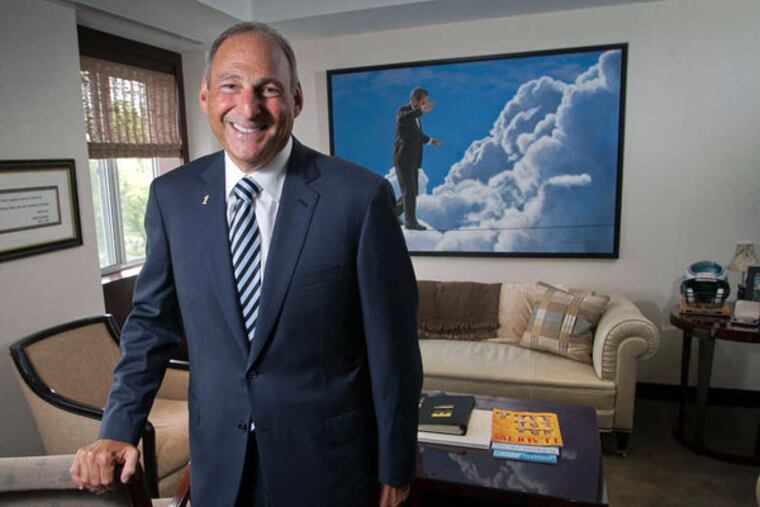He talks gladly about small banks; just don't ask about the Eagles
Banker Richard Green likes the Eagles. So, Green, the third-generation leader of his family-run Firstrust Bank, bought a share in the team and with that, a chance to stand on the sidelines. "It's a great thrill," he said.

Banker Richard Green likes the Eagles. So, Green, the third-generation leader of his family-run Firstrust Bank, bought a share in the team and with that, a chance to stand on the sidelines. "It's a great thrill," he said.
Green likes to vacation in the Turks and Caicos Islands in the Caribbean, "so I ended up buying a hotel there," he said. "It's ranked as one of the top hotels in the Caribbean."
Green, 63, has no trouble talking about his hotel, but he's mum when it comes to the Eagles and whether he counts quarterbacks among his friends.
"If you don't mind, I'd rather not dwell on that. It's really Jeffrey's thing," he said, referring to majority owner Jeffrey Lurie. "I'm very proud and happy to be associated with it. It's great for the community and for my kids and my family."
Your office is dominated by a huge painting of a gentleman in a business suit balancing on a tight rope. Is that you?
It's not me, but I was walking past a gallery in 2008 or 2009, and I saw this picture. Given where the world was [the worst recession since the Great Depression], this is not a bad description. It was a very, very dangerous time. I think very few people at the time realized how precarious things were.
During that period, you had an advisory role representing the interests of smaller banks before the Federal Reserve. What was that like?
The adage in Washington was if you're not at the table, you're on the menu. So I think I was probably at the table and on the menu. It was a chance for me to be of service to my country at a time that was critically important. And it was also very enlightening.
Were you impressed?
I was impressed because we earned the right to continue to face the challenges that we face today. That was the win - to be able to survive.
How did Firstrust handle that period?
Because of how strong and stable Firstrust is, there would have been a lot of other people destroyed before we would be. But we weren't immune. While we have never had a losing year in 81 years and we're very strongly capitalized, we made less money, and we had some losses. But we could sustain ourselves because of some of the moves that we had done and some of the things that we chose not to do.
For example?
We chose not to buy those tempting mortgage-backed securities that were rated AAA, but were filled with toxic mortgages. We try to do things that we understand. We said, 'Let's look inside and see what the loans are they're putting into these things.' When we did and [evaluated the individual mortgages], it didn't make any sense.
You also got lucky.
Lehman Brothers was a counter party for one of our trades, and we sold it the week before they went bankrupt. We [also] had a very big position in Freddie Mac and Fannie Mae stock. As you recall, that stock went from being extremely valuable to zero.
How did you dodge that?
We had been able to enter into another financial arrangement with Bank of America where, basically, we had a collar on the stock. If the stock would trade within a certain band that we agreed on, [we'd get the returns, but] if it went above that, then Bank of America would get the [upside] appreciation. If it went below that, then Bank of America would pay us. When it went from wherever it was to close to zero, we got paid.
Your grandfather founded Firstrust in 1934. Did you learn lessons from him?
I asked him, 'How do you get good judgment?' He said, 'Experience.' I said, 'Well, how do you develop experience?' He said, 'Bad judgment.'
Any future bankers among your children?
My son is a business major. [He] may have interest in it. My oldest daughter is going to law school. I think she aspires to be a district attorney.
The bank began in a South Philadelphia rowhouse. What's new these days?
We're reinventing ourselves again. It used to be the definition of convenience for a bank was an ATM on the street corner. How close am I physically? Now the definition, is: 'How can I touch the bank, any time, anywhere, from any device?' All of our investments have been in developing that technology to deal with distribution and information for the customer experience.
215-854-2769
@JaneVonBergen
StartText
Title: Chairman, chief executive.
Home: Bryn Mawr.
Family: Children, Brittany, 25; Jeffrey, 20; Julia, 17.
Diplomas: Haverford School; Tufts University, political science; University of Pennsylvania, master's in business administration; Southern Methodist University and University of Pennsylvania, law.
Resumé: Took over as chairman from his father, Daniel B. Green, in May. Joined bank in 1978 as general counsel.
As a child: To get spending money, "I had to submit a budget and a business plan to my dad."
EndText